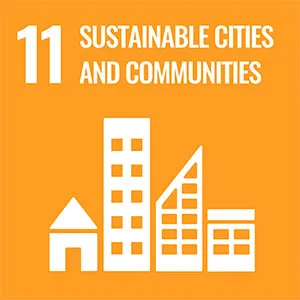MSc Architectural Lighting Design
Light is essential for human life and fundamental to the built environment at different scales: interior spaces, buildings, and urban areas. You will explore how the quality of natural and artificial lighting affects human behaviour, comfort and health. Sustainable development factors are in focus, including environmental, social, and economic aspects. Graduates have unique competence in lighting planning and can work in lighting design, architectural studios or as consultants.

Architectural Lighting Design at KTH
The master's programme in Architectural Lighting design offers a unique approach to light and lighting planning: a combination of visual, physical, and biological-based experience and knowledge applied to design, technology, and health. It provides an in-depth understanding of the field through scientific expertise and practical experience in artificial light and daylight. Graduates from the programme can apply advanced knowledge in lighting design in both practical and academic contects.
The programme uses innovative teaching and learning methods such as structured lectures and peer review practices. Interactive sessions foster a constructive learning environment where students and teachers develop their understanding of the subject through presentations, open discussions, tutoring and workshops.
The education mixes theory and practice, and your progress is assessed through a combination of individual and group assignments. You will also perform full-scale studies via prototypes and mock-ups to gain first-hand experience of light within architecture. Additionally, you will gain in-depth understanding of physical and visual phenomena through laboratory sessions. We also host a series of motivational lectures throughout the programme, where acclaimed international and national lighting designers, architects and researchers share their knowledge and expertise.
The programme is developed by the Lighting Design Division, one of five divisions of the Department of Architecture at the School of Architecture and the Built Environment at KTH. The Lighting Design Division, along with education, conducts several research projects that involve students collaborating with companies and other institutions. The division also organises events to connect academia with businesses and research institutions on specific topics, such as the annual Light Week, a collaboration with the Swedish Energy Agency. Since 2010, the division has organised the Light Symposium, a two-day international event focused on light and health, partnering with the universities of Wismar, Aalborg and South-Eastern Norway. The event was hosted at KTH in 2010, 2015, 2018 and 2023.
This is a full-time one-year programme (60 ECTS credits) taught in English. It consists of four courses and a master's degree project that you will conduct at the end of the second semester. The courses and the degree project are scheduled in a continuous sequence and there are no elective courses. Each course requires 100 % study pace, which correspond to 40 hours per week. Graduates are awarded the degree of Master of Science. The programme is primarily delivered at KTH Campus by the School of Architecture and Built Environment, and includes a series of study visits and workshops in and around Stockholm.
Light and Humans
The programme begins with the course in Light and Humans (9 ECTS credits). You will explore the relationship between light and humans, which is mediated by physical space. Knowledge related to light qualities, sources, materials, and cultural and human aspects is combined with the experience of the design process. After this course, you will be able to develop a comprehensive site-specific solution for a lighting design proposal, following a design method that considers social and human aspects.
Light and Space – outdoor
The following course is Light and Space – outdoor (12 ECTS credits). This course focuses on the relationship between light and outdoor environments, especially urban settings and their physical and cultural characteristics. It will enhance your understanding of the methodology, tools, concepts, and vocabulary associated with outdoor lighting processes. The design tasks conclude with full-scale hands-on lighting installations, preparing you to deal with challenges such as ecological impact, social interactions and integration within a specific urban identity.
Light and Science
At the final course for the first semester, Light and Science (9 ECTS credits), you will further develop your theoretical knowledge about light. You will focus on its relationship to space and humans through discussions between fellow students and researchers in the field, lectures, experimental sessions and study visits. You will gain the ability to analyse lighting conditions methodologically by understanding the visual and physical concepts of light. You will conduct a practical case study using a photometric and ethnographically informed approach that you will present as an academic paper.
Light and Space – indoor
In the course Light and Space – indoor (15 ECTS credits), you will learn the importance of dealing with daylight and its implications for indoor spaces. Additionally, the artificial lighting is taught as a complementary element for daylight and it develops through activities related to sources of light and technology, responsiveness, spatial theory and visual ergonomics, performance and sustainability. In the course, you will also enhance your skills in design, planning, calculations and presentation techniques through different projects based on real case scenarios.
Degree project
The programme concludes with a degree project designed to answer a specific research question, whether theoretically or practically. The focus is chosen from a wide variety of topics within the field of architectural lighting design, promoting sustainable development within the built environment. Theoretical papers with a strong focus on social and ecological sustainability about light and health, light and time, urban lighting, perception and information, as well as practical projects with a theoretical frame in rural lighting and interactive lighting design, are a few examples of previous degree projects. Throughout the years, the graduates from the master's programme in Architectural Lighting Design have consistently been granted national and international research funding and scholarships for developing their degree projects. Theses were submitted and awarded in international conferences.
Courses in the programme
The courses in the programme cover topics such as lighting design, architecture, well-being, sustainability, perception, psychophysical studies, quantitative and qualitative approaches, lighting laboratory and user-oriented approach.
Courses in the master's programme in Architectural Lighting Design
Future and career
Lighting is a rapidly evolving field of knowledge. In recent years, there has been a growing demand for lighting design expertise as lighting designers understand the role of light and lighting in architecture, interior spaces and urban environments. From this role you may add substantial value to a project by enhancing visual performance, energy efficiency, sustainability, safety, well-being and health. There are plentiful job opportunities on an international level for architects, designers and engineers with lighting design competence.
As a graduate you primarily work in lighting design or architectural studios or as self-employed consultants. Employers might also be construction companies, lighting manufacturers and public, including policy making, or private operators. After your master studies in Architectural Lighting Design you may also pursued doctoral studies (PhD studies) at KTH or other national or international universities.
Sustainable development
Graduates from KTH have the knowledge and tools for moving society in a more sustainable direction, as sustainable development is an integral part of all programmes. The three key sustainable development goals addressed by the master's programme in Architectural Lighting Design are:



Architectural Lighting Design plays a crucial role in the holistic concept of sustainability, influencing productivity, sociability, safety, orientation, and human health, while also representing a significant source of energy consumption. Sustainable lighting design seeks to balance visual and biological needs with minimal environmental impact, addressing both indoor and outdoor contexts, while exploring off-grid solutions that drive innovation in energy use and conservation
The programme integrates sustainability across social, cultural, economic, and environmental dimensions. Students gain the ability to identify and quantify the sustainability impacts of lighting design projects and are trained to apply ethical and professional responsibility in scientific and technical decision-making. Courses foster a human-centered approach that considers the social implications of urban lighting, promotes collaborative planning processes, and emphasises light’s influence on health and well-being.
Students also develop practical skills in analysing energy consumption, designing effective control strategies, and evaluating the economic viability of lighting installations. Evidence from research and practice underscores that lighting solutions grounded in a deep understanding of context, users, and technology lead to designs that are both economically sustainable and beneficial to human health. Through this comprehensive approach, graduates are well-prepared to contribute to sustainable cities and communities, responsible production and consumption, and the promotion of good health and well-being, aligning directly with several key UN Sustainable Development Goals.






